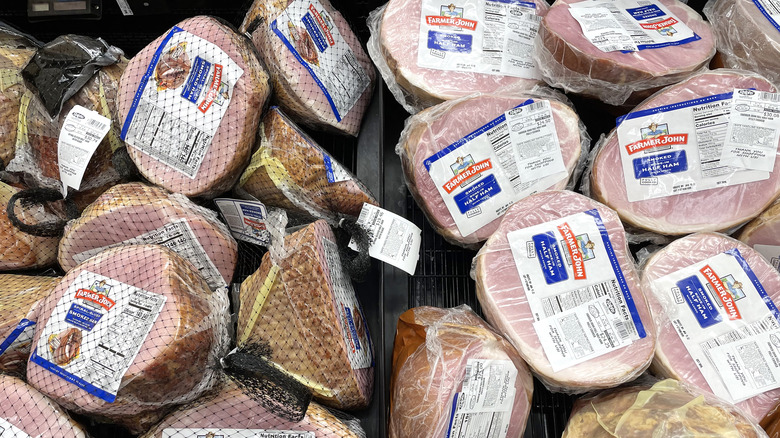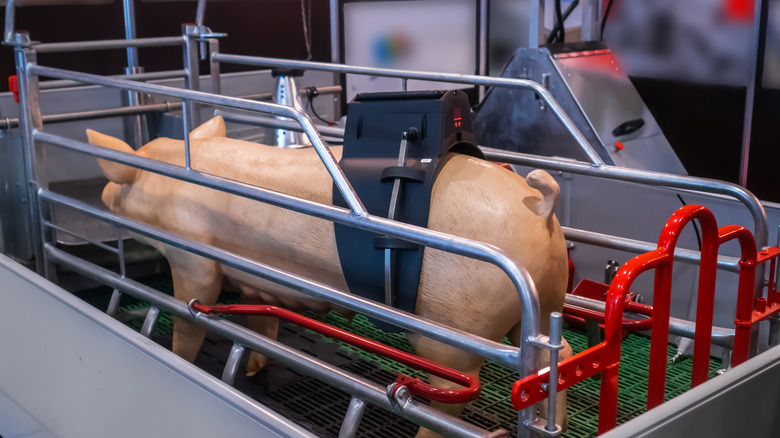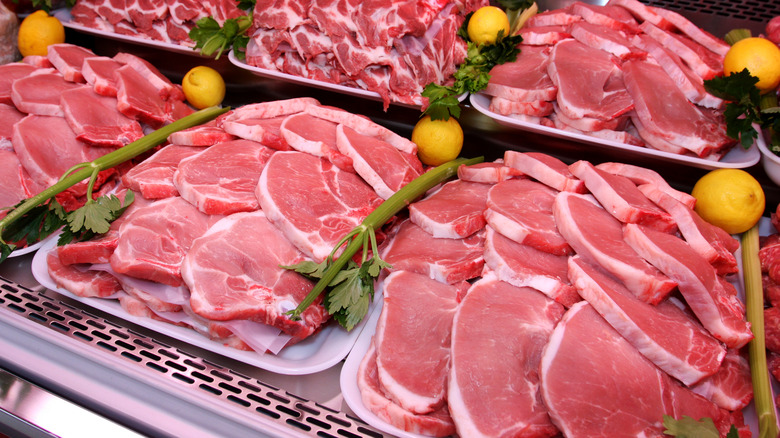Why California's Meat Industry Is Still Struggling With New Animal Welfare Legislation
Back in 2018, an overwhelming number of California voters put their seal of approval on what was then known as Proposition 12, which called for egg-laying chickens, breeding pigs, and veal calves to be raised in a humane way before they could be slaughtered and sold within the state. This meant that producers needed to give their poultry and livestock enough room to be able to stand and turn around. If producers didn't comply with these requirements, their eggs and meat would be banned for sale in California (via Food and Wine).
That proposition, which is now known as the Farm Animal Confinement Initiative, might seem like the right thing to legislate, but it appears to be a challenge to enforce. NBC News points out that while chicken and veal growers haven't had any problem bringing their poultry and livestock in line with the new requirements, pig growers never felt the same way. And when the law kicks in on New Year's Day of 2022, only four percent of pork producers around the United States will be compliant.
The situation will likely leave most pork producers unable to sell their meat in California — and Californians experiencing a squeeze in bacon and pork chop supplies — unless something is done.
Pork producers are balking at the cost of compliance
Pork producers cannot say they weren't warned that this was coming, since they had three years to put measures in place that would make their facilities compliant with the Confinement Initiative.
Part of their foot-dragging boiled down to cost: In order for pigs to be sold in California under the new regulation, their livestock could no longer be kept in what the industry calls a "gestation crate," a device the Humane League has described as a metal cage which barely allows a pig to move. Instead, a pig would need to be given 24 square feet of room to move about (via NBC News) — and one hog producer tells Food & Wine that changes like those that the Initiative is asking for could run into the millions of dollars.
The American Farm Bureau Federation and the National Pork Producers Council have tried to get the Initiative overturned. They say that by requiring out-of-state producers to fall in line with what California state law is asking, the state is also violating the Constitution's Interstate Commerce Clause. But U.S. Circuit Judge Sandra S. Ikuta, who handed a decision down on the case, doesn't see it that way. She wrote: "Proposition 12 is neither a price-control nor price-affirmation statute, as it neither dictates the price of pork products nor ties the price of pork products sold in California to out-of-state prices."
Industry groups want more clarity on the new humane law
Pork producers aren't the only ones unhappy about the new Farm Animal Confinement Initiative. Industry groups like the California Grocers Association, California Restaurant Association, California Hispanic Chambers of Commerce, and California Retailers Association aren't too keen, either — but that's because want some clarity on what the new rules mean and how they will be enforced. As such, they want the humane initiative delayed for about 28 months, until the final draft officially becomes law (via NBC News).
Even if the initiative is adopted on January 1st like voters asked, the National Pork Producers Council is confident that they have enough supply to meet demand, since the pork industry as a whole has 466 million pounds in cold storage. All it needs to find out now is whether California will allow pre-slaughtered pork to be shipped into and sold in the state before the deadline (via Food & Wine). And with so many questions left unanswered, a finite delay could work to nearly everyone's interests — except for the livestock in question, that is.


